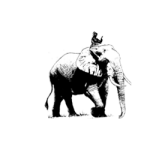 Our ability to concentrate on one thing to the exclusion of others can be practical and efficient. It is also a coping mechanism. Selective attention provides a way for us to navigate through the maze of data that comes our way every second of the day.
Our ability to concentrate on one thing to the exclusion of others can be practical and efficient. It is also a coping mechanism. Selective attention provides a way for us to navigate through the maze of data that comes our way every second of the day.
We can:
- Tune our ears – a mother reacting to a baby’s crying in the middle of the night,
- Focus our vision – finding your child’s face in a large crowd,
- Train our noses – some people learn to love the smell of brussels sprouts,
- Latch onto an idea to the exclusion of others – this is the best way to get this done.
By selectively attending we can get a number of things done.
We can also miss a lot of things, too. Take a look at the following from Christopher Chabris and Daniel J. Simons. Focus on counting the number of passes between team members with white shirts. Bounce passes count, too.
Well, how did you do? What did you attend to and what did you disregard or minimize?
In some cases selective attention is not only helpful, but required. On the other hand, selective attention can have negative effects. On October 21, 2009, two pilots on Northwest Airlines Flight 188 overshot their airport destination by 150 miles because they were having a deep discussion about what they were viewing on their personal laptops. They later said that they could hear voices on their cockpit radios but ignored them. Those voices were from ground controllers trying to get the pilots’ attention to find out if they were alright. The pilots’ licenses were revoked.
It has become popular today to take pride in one’s ability to multitask. The brain does not really multitask when concentrating. It task switches and then attends to that task to the exclusion of others until you task switch again. Task switching is a form of selective attention. The pilots of Flight 188 thought they were multitasking. They were not. Instead of flying the plane, they task switched, becoming two more passengers on Flight 188.
So what do you do to minimize the negative effects of selective attention?
Before starting something:
- Fight slipping into automatic behavior by visualizing what you are about to do,
- Avoid task switching activities that are not directly related to the task at hand – i.e. while you are driving – no texting, putting on make-up, eating your breakfast, reading the newspaper, shaving, or paying more than scant attention to that gift from God in the back seat in the safety restraint,
- Use soft eyes – focus as much on the general as the specific.